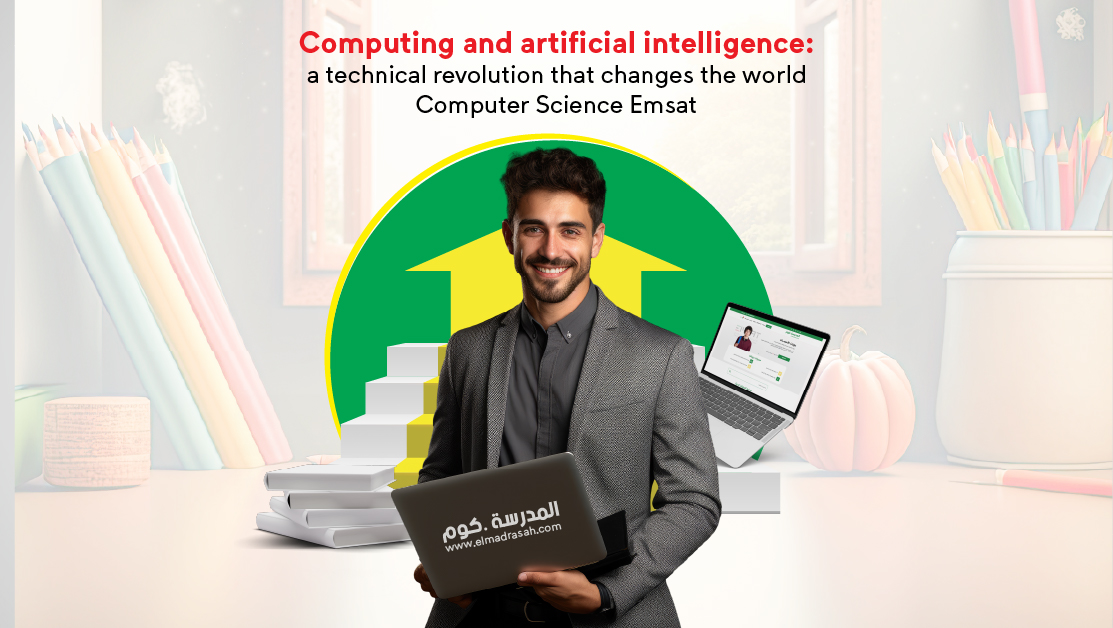
In our current era, computing and artificial intelligence are witnessing a massive technical revolution that greatly affects various aspects of daily life and various industries. Computing and artificial intelligence are no longer just advanced technical concepts, but rather have become an integral part of the development and progress of humanity. The technology boom in the field of computing and artificial intelligence is considered one of the most prominent phenomena that constitute a radical shift in the way we live and think. Therefore, many students are now interested in studying computer science Emsat in order to keep pace with the technological developments that are constantly occurring in our world.
This technical revolution depends on tremendous progress in several areas, including the ability of computers to process data at high speed and store huge amounts of information, and the development of smart algorithms that enable systems to understand and analyze data intelligently. Thanks to these developments, smart computing technologies can be applied in multiple fields such as medicine, manufacturing, commerce, education, and others, which contributes to improving operations, enhancing productivity, and providing innovative solutions.
With the advancement of computing and artificial intelligence, this development raises many questions and challenges, whether in the field of ethics and privacy, or with regard to its impact on the labor market and shaping the future of work, and even in its interaction with humans and influencing social relations.
So, computing and artificial intelligence are emerging as a transformative force for our time, with the ability to modernize and improve our existing systems and ways like never before. As we follow this technical revolution, it is necessary that we be aware of its broad impacts and work to exploit its potential in a way that enhances human well-being and the development of societies in general.
What does computing mean?
Computing is a term that refers to the process of using computers and computational technology to solve problems and perform tasks. Computing is an essential part of our daily lives, as many sectors and industries rely on computing to achieve their goals and facilitate their operations.
Computing is a revolutionary technology that has radically changed many fields such as communications, commerce, medicine, science, and entertainment. Computing allows us to store and process data in vast amounts, speed up calculations and analysis, and provide powerful tools for communication and collaboration.
Computing encompasses a wide range of concepts and technologies, from computing hardware and software to networks and the Internet. Computational technology is constantly evolving, giving rise to new and innovative solutions to the challenges we face.
Computing fields include many disciplines and applications. For example, in cloud computing, a group of servers and computing resources connected to each other over the Internet is used to provide services such as storage, computation, and remote operation. In the field of artificial intelligence and machine learning, computing is used to train intelligent models and analyze big data to extract patterns and make decisions.
Computing provides enormous benefits in our daily lives. They facilitate access to information and simplify many traditional processes. For example, we can now store personal data and important documents on small hard drives or in the cloud, protecting them from loss or damage. We can also communicate with others via email, instant chat and social media, which makes communication easy and convenient.
However, computing also presents challenges and difficulties. As the use of computers and computer technologies increases, the security threat and risk of hacking and theft of sensitive data is also increasing. Therefore, security and privacy issues must be carefully addressed and necessary measures taken to protect data.
In addition, computing also raises ethical and social issues. For example, we should discuss the challenges related to artificial intelligence and its impact on the labor market and employment. Will advanced computer technologies lead to the loss of traditional employment opportunities? How can we ensure technology is consistent with ethical values and respect for privacy and diversity?
Furthermore, there are also issues regarding the balance between the benefit of technology and its impact on the environment. High energy consumption and electronic waste are issues that require special attention in our pursuit of sustainable development.
Therefore, we must approach computing comprehensively and balanced. We must invest in research and development to develop safer, more effective and ethical technologies. We must ensure that there is legislation and policies that regulate the use of technology and protect the rights of users and society in general. We must teach individuals and organizations how to use technology in a smart and responsible way.
In conclusion, computing is a miraculous technology that changes our lives and provides us with tremendous opportunities. But it also comes with great responsibility. We must use computing wisely and take its associated challenges seriously. In doing so, we can continue to exploit its benefits and achieve sustainable progress and a prosperous society.
Why is the computer important in our lives?
The computer is a modern technological device that is considered one of the most influential inventions on our lives in the modern era. The computer is a powerful tool that helps us carry out tasks and solve problems efficiently and effectively. In this topic, we will explore the importance of computers in our daily lives.
- Improving communication and communication: Computers make it easier for us to communicate and interact with people all over the world. Through email, instant chat and social media, we can communicate with friends, family and colleagues easily and instantly. We can also share ideas, information and have discussions online.
- Facilitating access to information: The computer is an endless gateway to knowledge and information. Thanks to the Internet, we have access to websites, databases and digital libraries containing a huge range of information in diverse fields such as science, history, culture and art. We can also search for answers to our questions and solve problems through available search engines.
- Facilitating work and productivity: The computer enhances productivity at work and facilitates daily operations. Through programs such as word processing, spreadsheets, and presentation software, we can create and edit documents, reports, and presentations easily and quickly. We can also manage tasks, appointments and projects using project management software.
- Saving time and effort: The computer can perform calculations and process data very quickly and with high accuracy in a short time. This means we can get our tasks done faster and more efficiently. Furthermore, the computer can automate repetitive tasks, freeing up human time and effort for other value-added activities.
- Technology innovation and advancement: The computer enhances technology innovation and advancement in various fields. Researchers and developers are developing new programs and applications that meet our needs and make our lives easier. For example, artificial intelligence and machine learning techniques rely on computing to develop predictive models and artificial intelligence systems that are used to analyze data, make decisions, and predict the future. Thanks to technological advancement, computing is applied in fields such as medicine, engineering, business, science, etc., leading to improved services and innovations.
- Entertainment and entertainment: The computer plays an important role in providing means of entertainment and entertainment. We can watch movies, TV shows, listen to music, and read e-books. We can also play electronic games and immerse ourselves in exciting virtual worlds. The computer is a means of interactive entertainment and communication with global communities of players.
- Enabling creativity and learning: The computer helps enable creativity and learning. We can create and edit photos and video and develop artwork and designs using graphics and multimedia editing software. In addition, we have access to online learning platforms and educational resources available, enabling us to benefit from lessons and courses and expand our knowledge and skills.
- E-commerce and Business: Computers play a vital role in enabling e-commerce and online business growth. We can make online purchases and shop for products and services easily and safely. In addition, we can create online stores and trade with customers all over the world, which increases growth and expansion opportunities for the business.
- Distance education: In light of technological development, the computer has become an essential tool in the field of distance education. Students and learners can access online educational resources, participate in lessons via virtual classrooms, share knowledge and interact with teachers and colleagues around the world. The computer also allows learning languages and new skills through various applications and websites.
- Health and Medicine: Computers play a crucial role in improving health care and providing medical services. Doctors and nurses use computers to diagnose diseases, analyze medical data, visualize organs, and provide appropriate treatments. Patients can also access their medical information and communicate with doctors online for consultations and follow-up.
- Scientific research and engineering: The computer is a powerful tool in the field of scientific research and engineering. It can be used to simulate complex scientific processes, analyze data, and perform virtual experiments. Scientists and engineers can use computers to develop models, simulate their designs, and test their hypotheses before implementing them in reality, saving time, effort, and resources.
- Security and privacy: The importance of the computer also lies in providing security and privacy. The computer helps encrypt data and protect it from hacking and unauthorized use. Specialized computer programs can be used to detect security threats and protect against viruses and malware. Individuals and companies can also protect their privacy by using passwords, encryption techniques, and different privacy settings.
These are some points that highlight the importance of computers in our contemporary lives. It greatly affects various aspects of our daily lives and gives us access to a wide range of information, services and opportunities.
In conclusion, it shows us that the computer has played a major role in transforming and shaping our lives. It contributes to improving communication, facilitating access to information, increasing productivity, saving time and effort, promoting technological progress and innovation, providing entertainment and amusement, and enabling creativity and learning. Thanks to these benefits, it can be said with confidence that the computer has become an essential and indispensable tool in our daily lives.
What is the EmSAT test?
The Emsat test constitutes a gateway to a distinguished generation in the United Arab Emirates, as this standardized test is an essential gateway to evaluating students’ skills and abilities. This comprehensive testing system aims to enhance the quality of education and measure students’ understanding of the concepts and skills taught at all grade levels. The EMSAT test covers a variety of academic and linguistic areas and is a valuable tool to guide students towards their academic and professional futures.
The importance of the EmSAT test is evident in several points:
- Neutral and comprehensive assessment: The test assesses students’ abilities objectively and accurately without any bias towards school or geographic area.
- Improving the quality of education: Test results help schools and teachers improve the quality of education and identify students’ strengths and weaknesses.
- Student Guidance: Test results help guide students toward the appropriate academic and career paths for them.
- Promoting transparency and equality: Testing contributes to enhancing transparency in the educational system and ensuring that all students have fair educational opportunities.
The EMSAT test is available at different levels to suit all academic levels, allowing students’ progress to be assessed throughout their educational journey. The test is characterized by a highly accurate scientific design, a variety of questions, and continuous development to keep pace with changes in the curriculum and the needs of the labor market.
The EMSAT test forms an essential part of the educational system in the United Arab Emirates, as it contributes significantly to achieving educational excellence and providing fair and equal educational opportunities for all.
The importance of the computer science Emsat test in the field of artificial intelligence
The computer science Emsat Test is an applied test that aims to evaluate students’ skills in the field of computers and its applications. For the field of artificial intelligence (AI), passing the computer science Emsat Exam can be of great importance. Here are some reasons:
- Assessing Knowledge and Understanding: The computer science Emsat test helps assess students’ level of understanding of computing and artificial intelligence concepts. This helps ensure that students have acquired basic knowledge and understand the concepts and foundations of artificial intelligence.
- Practical skills assessment: The computer science Emsat test can include applied questions and tasks related to the field of artificial intelligence. This can include understanding and applying algorithms to solve problems, analyze data, design AI models, develop AI applications, and other skills related to the field of AI.
- Emphasis on professional competence: Students obtaining a certificate of passing the EMSAT test in computer science, including areas related to artificial intelligence, can be an indication of their professional competence and abilities in this field. This can have a positive impact on their future opportunities for higher education or employment in the computing and artificial intelligence industry.
- Career Guidance: computer science Emsat may help guide students toward their interests and career paths. An AI test can be part of a comprehensive exam, and based on its results, students can determine their interest and abilities in this field and make decisions about their future career.
The huge technological revolution caused by artificial intelligence
Humanity is currently living in an era of rapid technological transformations, and among the most prominent of these transformations is the technological revolution caused by tremendous progress in the field of artificial intelligence. Artificial intelligence (AI) is a branch of computer science that aims to develop systems and programs capable of simulating human intelligence and performing tasks that require intelligent thinking and intelligent decision-making.
The artificial intelligence revolution is one of the most controversial and contradictory technological transformations at the same time, providing enormous opportunities and new challenges that affect various aspects of human life.
- Effects of artificial intelligence:
- Improving productivity and efficiency: Artificial intelligence can significantly improve industrial and administrative processes through intelligent data analysis and data-based predictions, which contributes to increasing productivity and improving the quality of products and services.
- Developing health care: Artificial intelligence can contribute to improving the diagnosis of diseases and directing treatments, through analyzing huge medical data and applying machine learning techniques. This can improve healthcare and increase the chances of recovery for patients.
- Improving education and training: Artificial intelligence can help develop education and training methods by providing personalized learning technologies, customizing curricula, and evaluating student performance. This can improve the quality of education and provide more personalized learning opportunities for each individual.
- Social and economic changes: Artificial intelligence is causing structural changes in the labor market and traditional ways of working. Robots and automation can replace human labor in some tasks that require mechanical or repetitive skills. This may improve efficiency and reduce costs, but at the same time raises concerns about job losses and worsening social equity.
- Evolution of smart applications: Artificial intelligence can push the development of smart applications to new levels. For example, AI applications in machine translation, natural language learning, image and video analysis, smart sensing, user experience improvement, and many others. These applications can provide innovative and useful experiences for individuals and communities
- Challenges associated with artificial intelligence:
- Ethics and regulation: There is controversy over ethical issues related to artificial intelligence, such as privacy, control, and unjustified discrimination. There is a need to establish ethical rules, frameworks and laws to govern the use of artificial intelligence and ensure fairness and responsibility.
- Work and employment impacts: Rapid progress in artificial intelligence may lead to changes in the labor market, requiring the workforce to be qualified to meet new challenges and learn new skills required by the market.
- Control and transparency: Controlling smart systems and understanding how they work is a challenge. AI requires understandable and transparent systems to enable trust and accountability.
- Global inequalities: The spread of AI may lead to global inequalities in access and benefits. These inequalities must be addressed and benefits and opportunities are fairly distributed.
- Transportation and smart vehicles revolution: Artificial intelligence is a key driver for the development of sustainable transportation and smart vehicles. Artificial intelligence technologies are being used in the development of self-driving cars and intelligent traffic systems, increasing safety and efficiency and reducing congestion and carbon emissions.
- Robots and human cooperation: Artificial intelligence contributes to the development of robots capable of interacting with humans and cooperating with them in different work environments. Artificial robots can be assistants in industry, logistics, healthcare and more, improving productivity and reducing human errors.
- Security and defense: Artificial intelligence can play a crucial role in enhancing security and defense. It is used in developing smart surveillance systems, analyzing intelligence data, predicting events, and detecting security threats, which enhances the capabilities of countries to protect their citizens.
- Entertainment and Culture: Artificial Intelligence is a catalyst for innovation in the entertainment and culture industry. Smart applications powered by artificial intelligence can provide new interactive experiences in games, music, arts, cinema, and literature, enriching people’s lives and providing innovative entertainment experiences.
- Massive analysis and forecasting: Artificial intelligence has the ability to analyze huge amounts of data quickly and accurately, and uses it to extract future patterns and directions. These analyzes can contribute to strategic decision-making in various fields such as business, urban planning and economic development.
- Scientific research and new discoveries: Artificial intelligence can be a partner. Through its ability to analyze data and learn models, artificial intelligence can help accelerate the process of scientific research and make new discoveries in fields such as medicine, chemistry and physics. Artificial intelligence can be used to analyze the huge data available in research and guide researchers towards promising directions and new hypotheses.
- Future opportunities for artificial intelligence:
There are many future opportunities for artificial intelligence due to its continuous development and widespread impact on various industries and sectors. Among these opportunities:
- Improving operations and efficiency: AI can improve operations in many industries through automation and intelligent data analysis, reducing costs and increasing efficiency.
- Medicine and healthcare: Artificial intelligence can be used to diagnose diseases, guide treatment, and develop medicines, which improves the quality of healthcare and increases its effectiveness.
- Education: AI can personalize education according to the needs of each student, providing instant feedback to improve the learning experience.
- Commerce and Marketing: Artificial intelligence can be used to analyze consumer behavior and better target advertising, increasing the effectiveness of marketing strategies.
- Safety and security: Artificial intelligence can be used to analyze data to improve security systems and predict risks, whether in the security or public safety field.
- Economics and Finance: Artificial Intelligence can improve financial forecasts and analysis of economic data, helping in making better and more accurate economic decisions.
- Environment: Artificial intelligence can help researchers understand the impact of climate change and guide responses, as well as help improve the management of natural resources.
These are just some of the future opportunities, and as developments in the field of artificial intelligence continue, more new opportunities can be expected to emerge in the future.
The role of Elmadrasah.com platform in preparing to pass the computer science Emsat Exam
Elmadrasah.com platform is considered one of the most important Arab educational platforms that provides rich and useful content for students seeking to prepare for the computer science EmSAT exam. The platform provides a variety of features that help students achieve success in this test, including:
- Live lessons: The platform offers live online lessons by teachers specialized in computer science and information technology, which include a detailed explanation of basic concepts and practical applications.
- Recorded lessons: The platform provides a huge library of recorded lessons covering all sections of the computer science Emsat test, allowing students to watch them at any time and place and benefit from them for review and repetition after attending the live lessons.
- Practice tests: The platform offers a wide range of practice tests that simulate the real computer science Emsat test, which helps students evaluate their level and identify strengths and weaknesses.
- Reviews and preparatory books: The platform provides reviews and preparatory books dedicated to the computer science Emsat test, covering all sections of the test and providing a simplified explanation of the basic concepts.
- Forums and discussion groups: The platform allows students to communicate with each other through forums and discussion groups, which helps them exchange experiences and benefit from each other’s experiences.
- Tips and advice: The platform provides advice and guidance to students on how to prepare for the computer science Emsat exam, which helps them make the most of their potential.
- Question answer service: The platform provides a service to answer questions asked by students about the computer science Emsat test, which helps them solve any difficulties they may encounter during the preparation period for the test.
In short, Elmadrasah.com platform is one of the main tools that students can use to prepare for the computer science Emsat exam, and provides them with the necessary support and resources to achieve success in this exam.
By the end of this article, it comes to mind that computing and artificial intelligence are not just technologies that have evolved over the years, but rather a real technical revolution that has changed and is changing the entire world. From cloud computing to machine learning and smart robots, to big data analysis and artificial intelligence applications in all aspects of life, these technologies contribute significantly to improving productivity, developing services and achieving progress in many areas.
On the other hand, the computer science Emsat test appears as an effective assessment tool that contributes to improving the quality of education and directing students towards their better academic and professional future. Elmadrasah.com platform stands out as an important educational resource that helps students prepare for this test and achieve outstanding performance in it.
This concludes our journey in the world of computing and artificial intelligence, realizing that this field is still in continuous development, and that it has profound effects on our future and the shape of future societies. Therefore, we must embrace these technologies with caution, ethics and responsibility in mind, to ensure that they are used for the benefit of humanity and sustainable development around the world.















